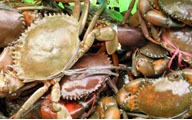
Aquaculture Creates New Opportunities for Villagers
Timor-Leste (East Timor) is an island nation northwest of Darwin, Australia. The country’s population of 1 million is one of the poorest in Asia despite its wealth of natural resources including petroleum, pristine coral reefs, and fertile land for coffee cultivation. After little over a decade of independence, the country continues to rebuild its physical and productive infrastructure and cultivating its national and cultural identity.
In 2010, ACDI/VOCA was awarded a grant from the United States Department of Agriculture under the Food for Progress program for a three-year project to cultivate mud crabs and fish in the coastal villages of Timor-Leste. In 2013 the project received an extension and continued through January 2015. The project operated in five districts and was implemented in collaboration with the Fisheries Department of the Ministry of Agriculture and Fisheries (MAF) and with local and international stakeholders.
Mud Crabs and Milkfish Offer High-Value Economic Opportunity
Mud crabs (Scylla serrata) are a prized delicacy throughout Asia, commanding high prices in restaurants and hotels. The crabs, which grow wild, are caught along the coasts of Timor-Leste, Australia, Indonesia and elsewhere in Asia. The Mud Crab and Fish project worked with coastal communities to raise mud crabs in cages partially submerged in coastal mangrove forests. There, the crabs are sustained by tides and supplemental feeding until they reach a marketable size.
Producers then expand to pen and pond cultivation with the project’s support. ACDI/VOCA emphasized sustainable mangrove use. By helping coastal communities understand the mangrove forests’ value from both ecological and economic perspectives, the program helped preserve these valuable natural resources.
Sustainable Aquaculture, Sustainable Markets
The program also explored sustainable cultivation of other aquaculture products including various fish species. The Mud Crab and Fish Cultivation project helped establish 85 producer groups along Timor-Leste’s coast to develop and manage crab and fish nurseries. Producers trained in crab and fish cultivation as well as business and group enterprise skills. Cages, pens, and ponds were built using local materials such as bamboo and palm stalk.
The project fostered strong relationships between producers and stakeholders within the value chain to ensure lasting market linkages.
Collaborating with Local Partners
The Mud Crab and Fish Cultivation project collaborated with local stakeholders. It worked with the Timor-Leste Ministry of Agriculture and Fisheries to build an aquaculture hatchery. The hatchery supplied crablets and small fish to producers throughout the country’s coastal districts. The hatchery was designed and built in collaboration with Ministry for Agriculture and Fisheries and in consultation with the South East Asian Fisheries and Development Centre. It is a valuable asset for developing new aquaculture technology in Timor-Leste. ACDI/VOCA provided both technical and business training to help the ministry successfully and independently manage the hatchery on a long-term basis.





